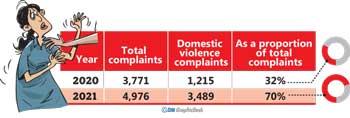Reply To:
Name - Reply Comment
 By Piyumi Fonseka
By Piyumi Fonseka
The National Committee on Women’s (NCW) “1938” hotline has received 3489 calls in the past year from women seeking help with domestic abuse incidents. This is almost triple the amount of calls received in 2020.
Sri Lanka, with an already high prevalence of gender-based violence, saw a rise in domestic violence cases during the lockdown. Experts believe that pandemic-related economic and social hardships exacerbated factors typically associated with domestic violence, such as increased unemployment, stress associated with family, and increased financial insecurity, and that the increased use of alcohol and other substances as a coping strategy also may have elevated the threat.
Domestic violence instances accounted for more than 70% of calls received in the past year. The highest number of domestic violence complaints were from the Gampaha district, followed by the Colombo, Kandy, Kalutara, and Kurunegala districts.
With perpetrators confined with victims during last year’s travel restrictions, there may have been many more who have been unable to contact or seek out for assistance.
The helpline was established to assist in receiving complaints about all forms of discrimination against women by referring them to appropriate government, non-government, and relevant individuals for assistance and relief, as well as directing them to counselling and legal aid services based on the complainant’s personal needs and the nature of the problem.
Evidence from a recently published study by the UNFPA and University of Kelaniya found that 62% of homicides - out of the studied sample of 243 killings between 2013 and 2015 - were perpetrated by intimate partners, ex-partners and family members. Further, out of the 243 homicides reviewed, 128 of the cases identified the perpetrator as the intimate partner. Moreover, 69% of such incidences go unreported, which is a cause for alarm.